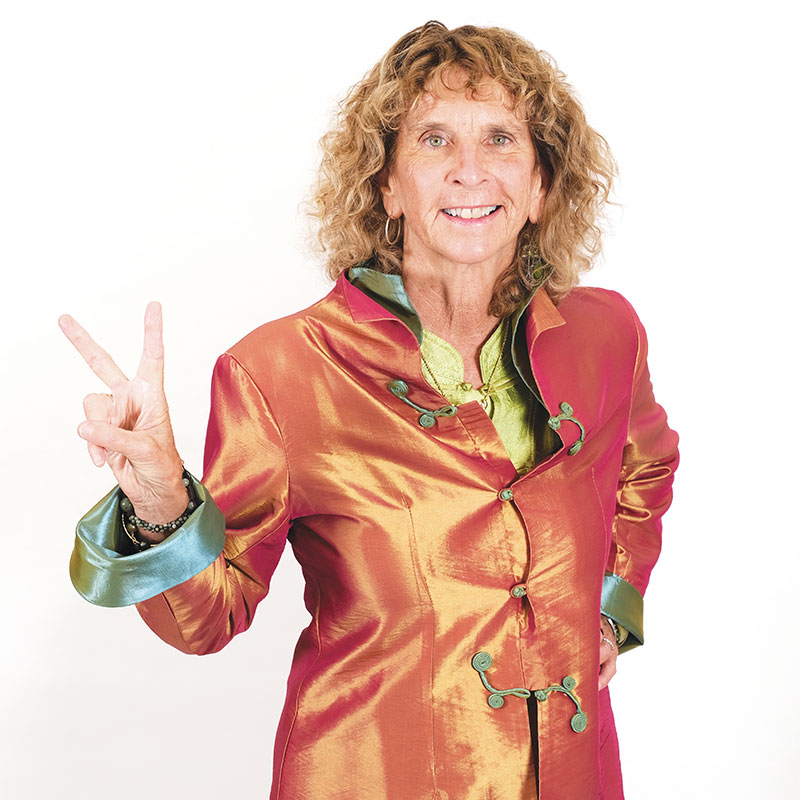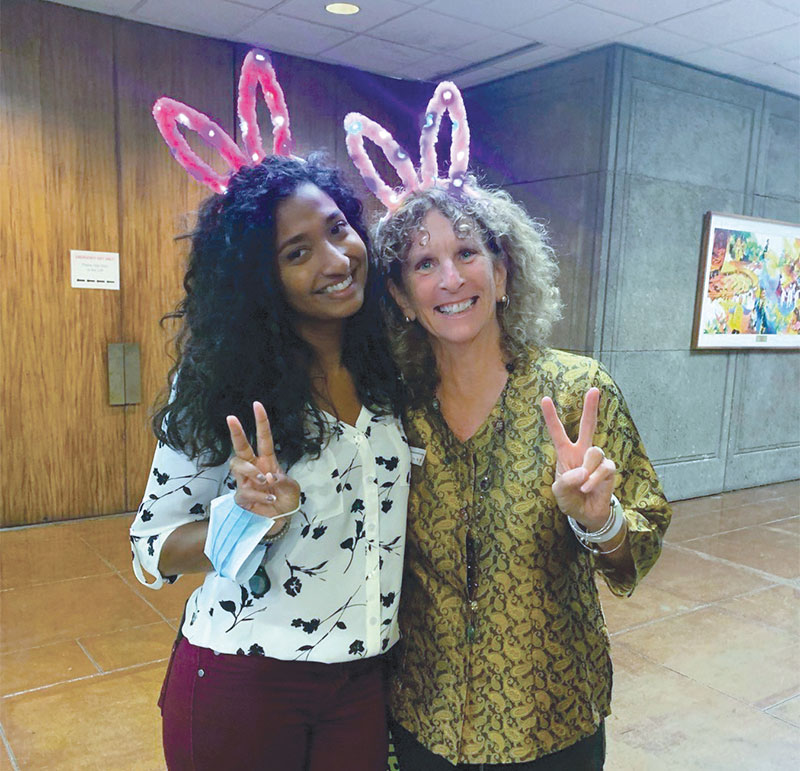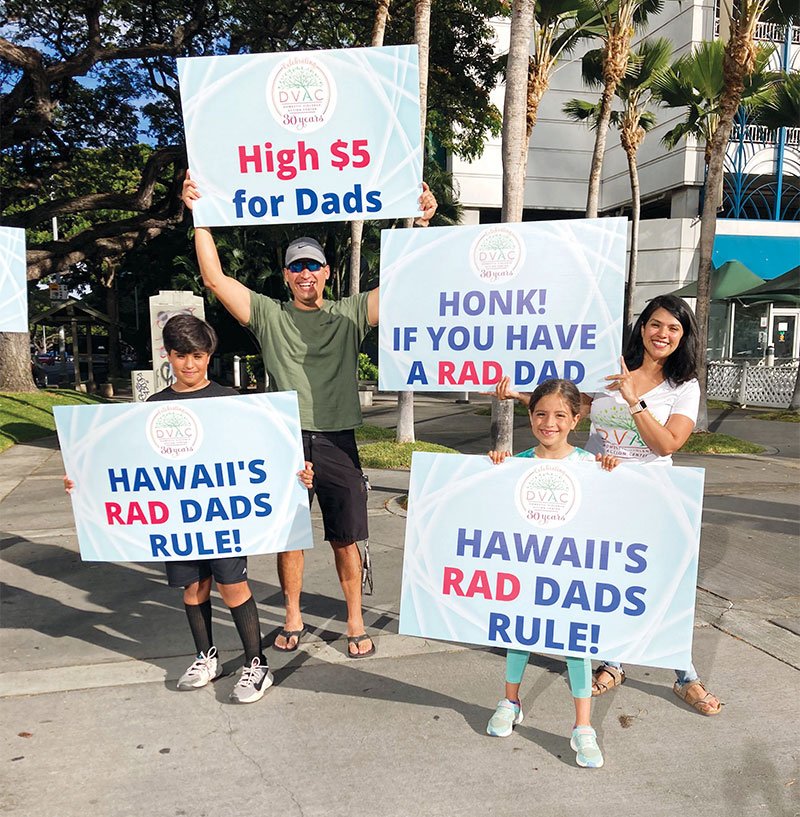Stop The Violence

Helping others lead lives that are free from abuse is the goal of Nanci Kreidman and her team of advocates at Domestic Violence Action Center.
Take a look around — you may be in the presence of someone who is silently suffering from domestic violence. It could be a friend, family member, co-worker or even the person standing ahead of you in line at the supermarket.
Whoever it may be, Domestic Violence Action Center exists to help.
“Our team of advocates help survivors on their long and tangled journey to safety. It’s a very different path for each person,” says CEO and co-founder Nanci Kreidman. “We just encourage people to consider their journey and their right to live free and safe.”

Nanci Kreidman (left) helped found Domestic Violence Action Center more than three decades ago. Over the years, she’s found willing allies in her fight to end domestic abuse in the islands, including former Honolulu Mayor Jeremy Harris. Domestic Violence Awareness Month is in October. PHOTO COURTESY DOMESTIC VIOLENCE ACTION CENTER
Whether it’s answering hotline phone calls, accompanying clients to court or providing safe housing, DVAC, which was founded more than 30 years ago, supports its clientele throughout the entire process. Thanks to quality and culturally sensitive programs, the center, according to Kreidman, aims to provide safety and self-sufficiency for survivors and their children.
“What goes on behind closed doors spills out into the marketplace, into businesses, into schools and into churches,” she says. “When we say that safe families are at the core of a healthy community — we really mean that. We can’t live in a community that is thriving and healthy if we don’t have safe families at its core.”

Peace is the hopeful sign for Nanci Kreidman and Tanya Philip, manager of Domestic Violence Action Center’s Teen Alert Program. Kreidman joins with First Circuit Chief Judge R. Mark Browning PHOTOS COURTESY DOMESTIC VIOLENCE ACTION CENTER
Being that each abuse case is unique, the center offers a personalized approach. Its staffers — who represent a melting pot of ethnicities — speak various languages such as Japanese, Korean and Filipino, to name a few.
“We recognize that the most useful support and help is offered by somebody who speaks your language, and understands your community norms and your community values,” Kreidman explains.

Kreidman joins with First Circuit Chief Judge R. Mark Browning in showing off their respective awards from Men’s
March Against Violence. PHOTO COURTESY DOMESTIC VIOLENCE ACTION CENTER
It’s an unfortunate reality that victims of abuse can be of any age. According to DVAC’s website, 1 in 3 teens in the United States has experienced physical, sexual, emotional or verbal abuse from a dating partner. To support Hawai‘i’s young population, DVAC created its Teen Alert Program (TAP) 20 years ago.
The center also developed its Ho‘oikaika ‘Ohana program, which strives to help families find peace — a direct response to a growing need in the Native Hawaiian community. Held over a nine-month period, the program provides families with opportunities to mend relationships through cultural practices such as lei-making, planting and pounding kalo, and chanting and dancing hula.

DVAC’s Rad Dad sign-waving event occurs annually on Father’s Day and attracts many enthusiastic
families. PHOTOS COURTESY DOMESTIC VIOLENCE ACTION CENTER
“We formed a hui to really help us develop the program that would meet the needs and reflect the cultural practices and the cultural values of Native Hawaiian families,” says Kreidman of the DVAC program that was developed nearly a decade ago. “We try to enhance the agency’s work with new programs when it appears that it would be in service to the community.”
Kreidman notes that more than 60% of domestic violence survivors they’ve met have also expressed the need for housing. In response, DVAC created programs that enable survivors and their children to live in safe and supportive spaces.
DVAC takes its work very seriously — and for good reason because lives could be at stake. Individuals who call its hotline can do so anonymously and feel reassured that their calls are held in confidence. The location of the center itself is also kept under wraps for safety reasons and is only shared with clients.
Since the center began collecting data in 2000, its staff members have worked more than 41,000 hours on document preparation and in court proceedings, conducted more than 89,000 risk assessments and completed more than 98,000 safety plans.
DVAC’s various services are free, with the exception of its legal services, which use a sliding fee scale. However, the center does not turn anyone away who can’t pay.
“It just makes me feel so happy that we have been able to make a difference in people’s lives — and maybe saved people’s lives,” Kreidman says. “The work our staff does is life-altering and lifesaving, and that really needs to be in sharp focus so that we can continue doing the important work that needs to be done.
“I have not been a victim of anything,” says Kreidman, who acknowledges that she’s among the lucky ones. “For me, it is a matter of moral and personal responsibility to make our community a safe, thriving place for all families.”
With Domestic Violence Awareness month coming up in October, Kreidman believes it’s important to remind everyone about the signs of abuse. These include the obvious red flags of physical abuse, like bruises or broken bones, or an abrupt change in personality, such as when normally sociable people suddenly choose to isolate themselves.
In addition to becoming familiar with the signs of domestic violence, she encourages the public to get involved by participating in community events, donating goods or adopting a family during the holidays.
“As a community, if we give permission and listen with an open heart and don’t make judgments about other people, we invite people to confide in us and we can help support them in making the difficult decisions about what kind of help they might need,” explains Kreidman.
She notes that survivors may feel ashamed to admit that they’ve experienced domestic violence, so it’s vital to demonstrate compassion and understanding.
“It’s a complicated circumstance for a person to be in and there’s a lot of ambivalence about staying or leaving. As a community, we want to be as supportive as we can,” Kreidman continues. “We have to extend compassion and patience to allow people to make the decisions that are right for them.”
Why do people stay in abusive relationships? Kreidman suggests that victims may believe they have nowhere else to go, or that their partner will change, or perhaps they’re afraid their abuser will become even more violent if they ever found out they were planning to end the relationship.
“Domestic violence really is a pattern. It’s not one incident or one kind of abuse,” she explains. “There’s a pattern of behavior that a person is subject to by their partner that’s centered around the power and control in the relationship.”
In addition to answering phone calls from survivors, the center fields calls from local community organizations, like food banks and homeless programs, that want to learn more about domestic violence in order to assist people.
To keep the community informed, DVAC travels throughout the state to give presentations and provide training so that the greater public is aware of the signs of domestic abuse.
“If we’ve got allies throughout the community positioned to recognize and identify domestic violence when it’s occurring, then we can all work in helping support families,” says Kreidman. “We can’t solve this problem alone. We need the community working with us. Whether it’s law enforcement or health care, or clergy, or educators or businesses — everybody can play a role.”
Kreidman’s dedication has not gone unnoticed. She’s received various awards for work performed within the community — one of them being the Patsy T. Mink Giraffe Award, which is given to a community stalwart who has demonstrated leadership in important issues.
“I do know a lot of people who have been victims and it just confirms the importance of the work that we’re doing at DVAC,” says Kreidman. “I realized that this is what I was meant to do in this lifetime and that I’m a messenger for others who can’t use their voice.”
To learn more about DVAC, call the center’s hotline at 808-531-3771 or visit domesticviolenceactioncenter.org.


